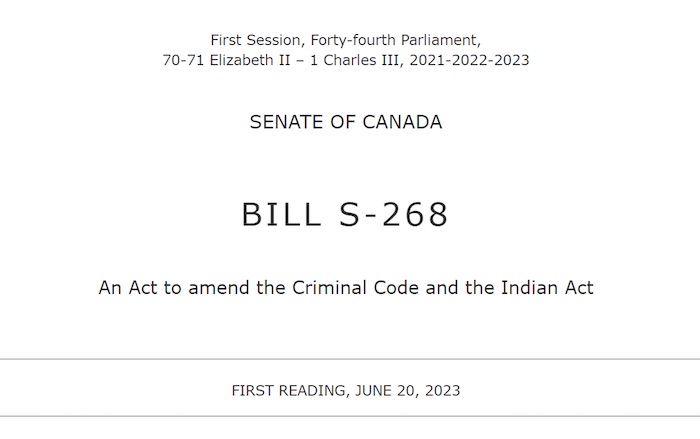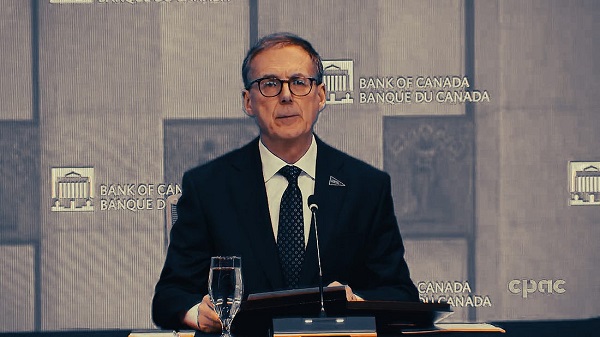Also Interesting
Why Bill S-268 Could Bring Real Changes for Indigenous Peoples and Gaming in Canada

The latest installment in the story of legal gaming and betting in Canada happened on June 20, 2023, when Bill S-268 had its first reading. If the Bill passes, it will bring big changes for Indigenous peoples in the country and their involvement in the Canadian legal gaming landscape.
This happening follows other major changes to iGaming and sports betting in Canada. In April 2022, Ontario became the first Canadian province to launch a regulated iGaming market. This launch followed the legalization of single-event sports betting the previous year. Now, players can enjoy games and sports betting at Ontario online casinos that are registered and regulated by the Alcohol and Gaming Commission of Ontario or (AGCO). These big changes in Ontario are now being followed by Bill S-268.
What is Bill S-268?
The Bill was put forward by Senator Scott Tannas and intends to amend the Criminal Code of Canada in terms of the legality of lottery schemes in the country. If the Bill progresses, the First Nation will be permitted to license and manage lottery schemes on its reserve. They will have sole responsibility for operating such lotteries as long as they notify the Canadian Government and the provincial government of the intention to do so. In addition, the content of the Bill refers to amending the Indian Act to allow the council of the band authority to create bylaws concerning the operation and management of proposed lotteries.
How the Bill will change iGaming in Canada
The current laws concerning iGaming in Canada state that it’s illegal in the country. However, Section 207 of the Criminal Code of Canada allows provincial governments to conduct and manage iGaming within their own province. This ruling means that any lottery schemes in the country must be operated by a provincial government.
If Bill S-268 passes, it will change the status quo by removing the effective monopoly that provincial governments have on the conducting and management of lotteries. The preamble for the Bill refers to the changes being part of the recognition of the Inherent and Treaty rights of Indigenous Peoples. This means that the Bill is not about bringing new rights for Indigenous Peoples but seeks to confirm the rights they already have.
The future of iGaming in Canada will be significantly changed by Bill S-268 if it passes. It will help to further the reconciliation between Canadians and Indigenous Peoples. Plus, it will enable Indigenous Peoples to have full control of their own lotteries. This means they will make more money from operating lotteries which will bring financial benefits to them and further the recognition of their rights.
It remains to be seen whether the Bill will pass, but there is support for it, especially within Indigenous communities. There is also a certain amount of resistance from provincial governments that are wary of their dominance in iGaming being diluted. Now that the first reading of the Bill is complete, there will be much interest concerning its progression.
Alberta
From Underdog to Top Broodmare

WATCH From Underdog to Top Broodmare (video)
Executive Producers Jeff Robillard (Horse Racing Alberta) and Mike Little (Shinelight Entertainment)
What began as an underdog story became a legacy of excellence. Crackers Hot Shot didn’t just race — she paved the way for future generations, and in doing so became one of the most influential producers the province has known.
The extraordinary journey of Crackers Hot Shot — once overlooked, now revered — stands as one of Alberta’s finest success stories in harness racing and breeding.
Born in humble circumstances and initially considered rough around the edges, Crackers Hot Shot overcame long odds to carve out a career that would forever impact the province’s racing industry. From a “wild, unhandled filly” to Alberta’s “Horse of the Year” in 2013, to producing foals who carry her spirit and fortitude into future generations.
Her influence ripples through Alberta’s racing and breeding landscape: from how young stock are prepared, to the aspirations of local breeders who now look to “the mare that did it” as proof that world-class talent can emerge from Alberta’s paddocks.
“Crackers Hot Shot, she had a tough start. She wasn’t much to look at when we first got her” — Rod Starkewski
“Crackers Hot Shot was left on her own – Carl Archibald heard us talking, he said ‘I’ll go get her – I live by there’. I think it took him 3 days to dig her out of the snow. She was completely wild – then we just started working on her. She really needed some humans to work with her – and get to know that people are not scary.” — Jackie Starkewski
“Crackers Hot Shot would be one of the top broodmares in Albeta percentage wise if nothing else. Her foals hit the track – they’re looking for the winners circle every time.” — Connie Kolthammer
Visit thehorses.com to learn more about Alberta’s Horse Racing industry.
Also Interesting
KYC in Casino Gaming

KYC, which means “Know Your Customer,” has become one of the most important systems in casino gaming today. In the early days of online gambling, players could simply sign up, deposit money, and start playing without giving much personal information. But as online casinos grew, so did the need to confirm who was playing, how they were paying, and where their funds came from.
This change was not sudden. It came through years of regulation, fraud cases, and technological improvement. Even $3 minimum deposit casinos now use KYC to make sure their players are verified and protected.
How KYC Began in Casino Gaming
In the late 1990s the internet was still in its early days, and online casinos came into the picture with hardly any rules regarding identity verification. Security was not a primary concern for gambling platforms, which were mainly occupied with game development and player attraction.
Fraud and underage gambling activities were rampant at that time. Stolen credit cards were being used by some players while others were using fake identities to get through age restrictions.
Regulators soon pointed out that a total lack of control could lead to bigger issues like money laundering and illegal transfers. So, new rules were imposed by the government and one of them was to get the casinos to collect the most basic player information including name, address, and date of birth.
These details, however, did not do much to prove that the players were actually human beings. Nevertheless, it was still very far from what KYC would later turn into.
The Rise of KYC Laws and Regulation
As online gaming spread across Europe and other regions, regulators made stricter laws. They wanted casinos to take responsibility for who was playing on their platforms.
Around the mid-2000s, KYC laws became mandatory for any casino that held a license. This meant players had to submit documents like passports or utility bills to prove their identity and location.
It was not always smooth. Many players disliked sending personal documents online, especially when the internet still had many privacy risks. Casinos also found it challenging to process thousands of verification requests.
But as technology improved, so did trust. Encryption became stronger, and online platforms became safer. This marked the true beginning of proper KYC systems in casino gaming.
Why KYC Became So Important
The goal of KYC is simple. It makes sure gambling stays safe, legal, and fair. With KYC, casinos can stop criminals from using their platforms to clean illegal money.
It also protects players by preventing identity theft and underage gaming. Over time, players began to understand that KYC was not just about restrictions. It was about protection.
A verified account means that a casino can return funds to the rightful owner if there is any problem. It also helps regulators ensure that every transaction is transparent and traceable.
In short, KYC built the bridge of trust between casinos and their players.
Technology Transformed the KYC Process
KYC was initially a hand-operated process. Players needed to upload their document’s scanned copies. The casino personnel then manually checked them. This process could last for days and even weeks sometimes.
However, technology has completely altered that scenario. Currently, most of the casinos make use of KYC automatic verification systems powered by AI.
These systems can read and verify an ID within seconds. The system checks its authenticity and even compares the image to a selfie taken by the player.
There are also some casinos that go for biometric verification as well. Players use their fingerprints or facial recognition to verify their identity.
Moreover, blockchain technology has started to play a role in KYC. The use of blockchain ensures safe storage of identity data. Players can provide it to the casinos without having to resend the same information over and over again.
This not only saves time but also keeps user data secure.
Challenges That Still Exist
Even though KYC has come a long way, it is not perfect. Some players still struggle with the verification process, especially in countries where official identification is hard to get.
Others worry about data security and how casinos store their personal information. Casinos face the challenge of balancing speed and safety.
They need to verify players quickly without making the process so strict that it drives them away. The rise of global players also means casinos must follow different KYC laws in different countries. This can be complex to manage.
The Future of KYC in Casino Gaming
The next stage of KYC looks even more advanced. Artificial intelligence will continue to play a huge role. It will help casinos detect fake IDs and spot suspicious activity automatically.
We may also see more global identity databases. They will make cross-border verification easier and safer.
In the future, players could control their own KYC data through secure digital wallets. They can choose which casino to share their identity with. This will keep privacy fully in their hands.
With this kind of progress, both players and casinos win.
How KYC Strengthens the Trust Between Players and Casino
KYC has undergone a radical transformation from being a mere requirement to being the mainstay of trust in online gambling. It is the one that assures clean money, fairness in games, and safety for players. Online gambling would otherwise be a scene of chaos, fraud, and continuous disputes.
KYC compliance and casinos having better verification systems are proving to be very active in promoting and maintaining the integrity and transparency of the industry. KYC has transitioned from being merely a concept to being a pillar, and it continues to regulate the gaming world.
The casino gaming universe is in a state of flux and the pace is quicker than ever. KYC is among the main reasons for this. It is the backbone of a safe, fair, and responsible gambling practice. It not only protects players but also the gaming platform, thus providing a trust-building environment for the online gaming industry to expand.
-

 International2 days ago
International2 days agoBiden’s Autopen Orders declared “null and void”
-

 Business2 days ago
Business2 days agoTrans Mountain executive says it’s time to fix the system, expand access, and think like a nation builder
-

 National10 hours ago
National10 hours agoCanadian MPs order ethics investigation into Mark Carney’s corporate interests
-

 Business1 day ago
Business1 day agoCanada has given $109 million to Communist China for ‘sustainable development’ since 2015
-

 Business2 days ago
Business2 days agoCanada’s combative trade tactics are backfiring
-

 Canada Free Press2 days ago
Canada Free Press2 days agoThe real genocide is not taking place in Gaza, but in Nigeria
-

 Opinion1 day ago
Opinion1 day agoBritish Columbians protest Trump while Eby brings their province to its knees
-

 Banks15 hours ago
Banks15 hours agoBank of Canada Cuts Rates to 2.25%, Warns of Structural Economic Damage





